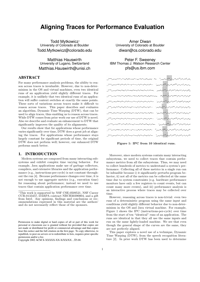Aligning traces for performance evaluation
For many performance analysis problems, the ability to reason across traces is invaluable. However, due to nondeterminism in the OS and virtual machines, even two identical runs of an application yield slightly different traces. For example, it is unlikely that two identical runs of an application will suffer context switches at exactly the same points. These sorts of variations across traces make it difficult to reason across traces. This paper describes and evaluates an algorithm, Dynamic Time Warping (DTW), that can be used to align traces, thus enabling us to reason across traces. While DTW comes from prior work our use of DTW is novel. Also we describe and evaluate an enhancement to DTW that significantly improves the quality of its alignments.
Our results show that for applications whose performance varies significantly over time, DTW does a great job at aligning the traces. For applications whose performance stays largely constant for significant periods of time, the original DTW does not perform well; however, our enhanced DTW performs much better.
- Login to post comments



